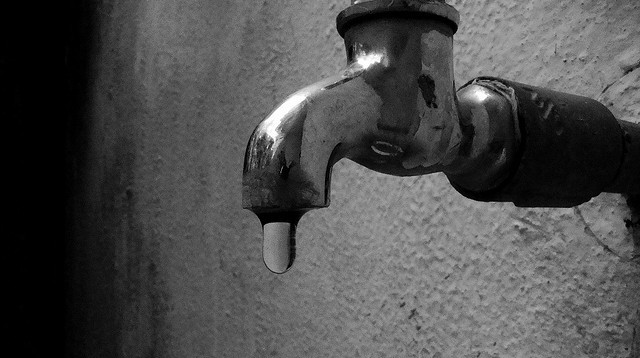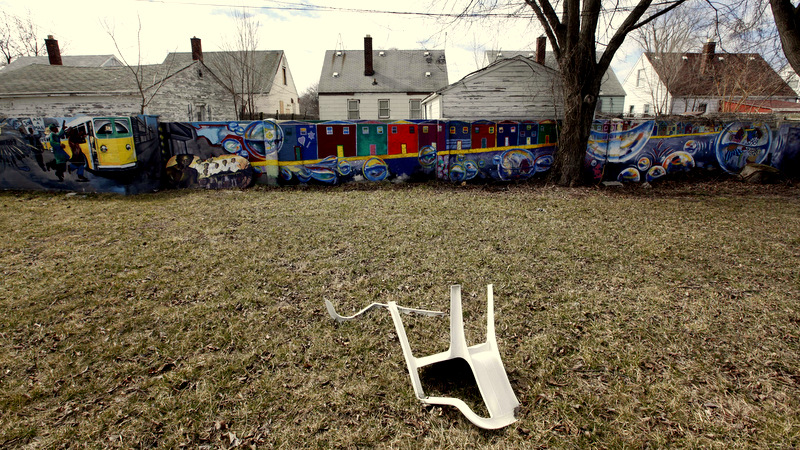
WASHINGTON — Three U.N. experts warned Wednesday that the city of Detroit’s new mass disconnection of residential water service for delinquent payments could be a violation of multiple international human rights obligations.
In March, Detroit officials announced that they would begin halting water service to customers that are two months behind in their bills or owe more than $150. Since the city stepped up this process at the beginning of this month, Detroit is now cutting off service to up to 3,000 customers per week. The new policy could affect some 30,000 households in coming months, activists say.
Yet critics note that Detroit’s water prices are far higher than in other U.S. municipalities, even as the city’s poverty rate hovers above 40 percent. Last week, advocacy groups submitted areport to the office of the U.N. special rapporteur on drinking water, warning that the city’s water bills have become “unaffordable to a significant portion of the population.”
On Wednesday, three special rapporteurs indicated strong preliminary disapproval of Detroit’s new cut-off policy.
“Disconnections due to non-payment are only permissible if it can be shown that the resident is able to pay but is not paying. In other words, when there is genuine inability to pay, human rights simply forbids disconnections,” Catarina de Albuquerque, the U.N.’s first special rapporteur on water and sanitation, said in astatement.
Two other experts, the special rapporteurs on adequate housing and extreme poverty, concurred, noting that shutting off water services over nonpayment due to lack of means “constitutes a violation of the human right to water and other international human rights.” The three also stated that the city would need to immediately reconnect service to households that have experienced “unjustified disconnections.”
Rights precedent
Special rapporteurs are not U.N. staff members and their positions are honorary. However, they are formally appointed by the U.N. Human Rights Council to study a variety of issues, most backed by internationally agreed upon rights. Further, the findings and opinions of rapporteurs can carry significant weight in building precedent, as organizers of the recent Detroit submission are now hoping will happen.
“This submission was primarily about establishing this situation as a human rights violation, and hopefully will be complementary to other strategies,” Meera Karunananthan, an international water campaigner for the Blue Planet Project, an initiative of the Council of Canadians, told MintPress News ahead of the U.N. experts’ statement.
“First, the rapporteur’s opinion would strengthen any legal case that could go forward against the city of Detroit. Second, the United States is accountable to the international community, so hopefully this issue will be brought forward at the U.N. Human Rights Council.”
On Wednesday, de Albuquerque urged the U.S. government to adopt a federal standard on affordability for water and sanitation in order to “provide protection against disconnections for vulnerable groups and people living in poverty,” reiterating a call she first made in 2011.
Detroit Water and Sewerage Department officials say that only a small percentage of those receiving shut-off notes actually have their water disconnected. On Tuesday, the department offered figures for May, during which just 10 percent of those receiving notices had their water disconnected. Further, a majority of those had their water reconnected within two days, following payment.
“Our goal is to have as few shut offs as possible,” the department’s director, Sue McCormick, said in a release. “Many of the properties that we shut off are actually vacant structures, not occupied homes.”
A spokesperson for the Detroit Water and Sewerage Department declined to comment on the U.N. statement. But the official, Greg Eno, did tell MintPress that the city will roll out an assistance program around residential water at the beginning of July. In addition to state and county human services, Eno said, Detroit residents who meet certain guidelines under the initiative will be able to receive help in paying their water bill.
20 percent of income
Concerns around municipal water prices in Detroit have been building for a decade, with the report to the United Nations estimating that city water bills during that period have grown by around 119 percent. Today, the Blue Planet Project’s Karunananthan says, Detroit residents are spending an average of 20 percent of their income to pay for their water every month — a ration she calls “outrageous.” (City officials were unable to confirm this estimate.)

“On the one hand, you get the sense that this story is about people not paying their bills,” she said. “But in reality this is a public service — the people of Detroit are entitled to this service. Utilities shouldn’t be setting rates that are unaffordable.”
Further, the submission to the United Nations details significant potential savings among the city’s industrial, rather than residential, ratepayers, as well as what appears to be a double standard.
According to findings by an advocacy group attending finance committee meetings of the Detroit Water and Sewerage Department, some 57 percent of commercial users and 55 percent of industrial users are delinquent in their water bills, totaling nearly $30 million in arrears. (Eno, the city spokesperson, told MintPress these figures are likely correct.)
Yet according to the report, these companies and institutions “have not been targeted in the same way as residential users.”
Though such frustrations among residents have been strengthening in recent years, the situation took a significant turn last summer, when Detroit finally declared bankruptcy. Since then, the city’s operations have been taken over by an emergency manager tasked with cutting costs and returning the budget to solvency.
While this summer’s policy on water disconnections likely has its roots in attempts to raise funds, a process is also currently underway by the emergency management team to explore options for partnering with private water companies in Detroit. Some see a connection with this summer’s service cut-offs, perhaps aimed at trying to entice potential investors.
“We know the city has put out a request for proposals for at least partial privatization, including management of the water system, and over 50 corporations have already responded to that request,” Katherine Sawyer, a water organizer at Corporate Accountability International, a watchdog group, told MintPress.
“With these cut-offs, we see the city behaving similar to companies operating on contracts — managing the city’s system for profit rather than for the overall health and welfare of Detroit’s citizens.”
Push for privatization
Today, more and more U.S. cities are coming under pressure from private water companies, the result of federal infrastructure budgets that have been repeatedly slashed for decades. According to data provided by Food & Water Watch, another watchdog group, federal spending on improvements to drinking water and wastewater systems since the late 1970s have dwindled by some 80 percent.
Since the late 1990s, the group says, federal grants have offered just $15 billion for this purpose. Last year, the Environmental Protection Agency estimated that some $384 billion in improvements would be needed in U.S. drinking water infrastructure over the next two decades. The agency also found that many of the country’s 73,400 water systems are between 50 to 100 years old.
Last week, Corporate Accountability International released apaper rounding up experiences from mayors across the country regarding what they say is strengthened pressure from the private water industry. Private water systems have been found to be pricier than publicly run utilities, while also running into trouble over equitable access. But the new paper shows increased pressure on mayors to enter into public-private partnerships and consultancies.
Sawyer says such deals remain dangerous for consumers.
“From what we see, water is not like other municipal services and should never be privatized,” she said.
“These new consulting contracts are repackaged privatization deals. While many of the contracts initially aim to increase efficiency, if the city wants to implement the recommendations they are forced to enter into partnerships that allow for greater control and access by corporations.”
Detroit’s water infrastructure is currently estimated to need more than $5 billion in upgrades, some of which are thought to be urgent. In this respect, Detroit stands today as an illustration of the pressures that cities across the country will likely face in the near future.
“Unfortunately, Detroit is a great example of what can happen with a lack of [infrastructure] funding,” Sawyer said. “The city’s system obviously has a lot of difficulties to overcome, but privatization is likely only to exacerbate those issues.”
The Blue Planet Project’s Karunananthan likewise noted that the big story behind Detroit’s situation is the underfunding of water infrastructure across the United States. “But,” she warned, “transferring those costs to users is not the solution.”

